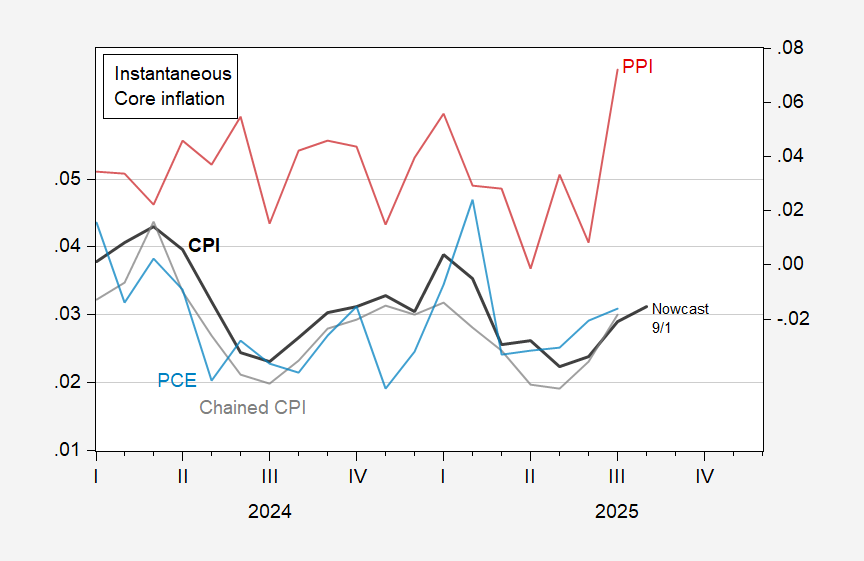
Occasionally, I use a grocery delivery service—not always, and not for every item. In a vacuum, one might think that having someone else take the time to gather grocery items for me and bring those items to my house seems clearly advantageous. So why don’t I always use this service? A few ideas from economics help explain why.
For one, it’s not always the case that the time spent grocery shopping is purely a cost. While I know this isn’t true of everyone, I actually rather enjoy grocery shopping. Walking up and down the aisles of the store, chatting with my kids—that’s something I look forward to doing every weekend. Having all my groceries delivered would mean losing those outings, and I don’t particularly want that. Whether the time and effort of going out shopping is a cost or a benefit is subjective—it depends on the person doing it.
Given my preferences, why do I ever use grocery delivery? Most of my grocery and general household supply shopping is done with a weekend Target run. However, there is a handful of grocery items I like that aren’t typically carried by Target but are usually available from Whole Foods. The nearest Whole Foods locations aren’t particularly convenient to where I live, and especially not relative to the Target where my weekly shopping runs occur. Tacking on an additional stop at Whole Foods (or finding some other time to insert a Whole Foods run) for a relatively small selection of items is too high a transaction cost in terms of time and effort. There is a delivery fee, but that is well worth saving the time and effort of a secondary stop.
I’ve found that most produce items from Whole Foods are better than they are from Target. Despite this, I usually get my produce from Target rather than including them in my Whole Foods delivery. If I’m going to place a Whole Foods order anyway, and if produce from Whole Foods is generally better in my estimation, why don’t I just get those items from the grocery delivery service? There are two reasons: information asymmetries, and a principal-agent problem.
Information asymmetries prevent potential gains from trade from being made when both parties don’t have the same information. For example, when I buy bananas, I try to get a small bunch of bananas that are yellow (to be eaten over the next few days) and a small bunch that are green (which will be ready to eat by the time the first bunch is done). A store employee picking out items for me doesn’t have access to that information, so the bananas I’d get wouldn’t line up with what I actually want. The same is true for an item like avocados. Another example: when I’m in the store, I try to get a sense of how far away the avocados are from ripening before I buy them based on how firm they are. The window between an avocado that’s a bit too underripe and one that’s overripe to the point of being a disgusting mess is fairly narrow (by my estimate, the window for an avocado to be “just right” lasts approximately thirty-seven seconds). Someone at the store doesn’t know that I’m buying an avocado for a recipe I intend to try out on Thursday, so they don’t know which kind of avocado would be best for me to get. When the store shopper doesn’t know my preferences, I don’t get what I want for the price I pay, and potential economic value isn’t realized.
The principal-agent problem occurs when I have someone ostensibly working on my behalf, but their incentives don’t align with what would best serve my interests. When I’m getting, say, raspberries from the store, I often take a bit of extra time to sort through the selection available. Often, there will be at least some cases of berries where the fruit inside has gotten squished, or some of the berries are already starting to look a bit wilted. For me, it’s worth it to take the extra time to sort through the available selection and find a batch that looks good. But someone packing groceries for a home delivery order has different incentives. Their goal is to pack up this order as quickly as possible and move on to the next one. They don’t have any particular incentive to stop and spend extra time sorting through the produce to find the best-looking available batch.
None of what I’ve just described is especially cutting edge—but that’s part of the point. As I’ve argued before, many ideas in economics can be easily recognized in how we make choices in everyday life. Economics is rooted in human behavior. The lessons and ideas of economics are like the water in which fish swim—it surrounds us so thoroughly that it becomes almost invisible from its own ubiquity.

